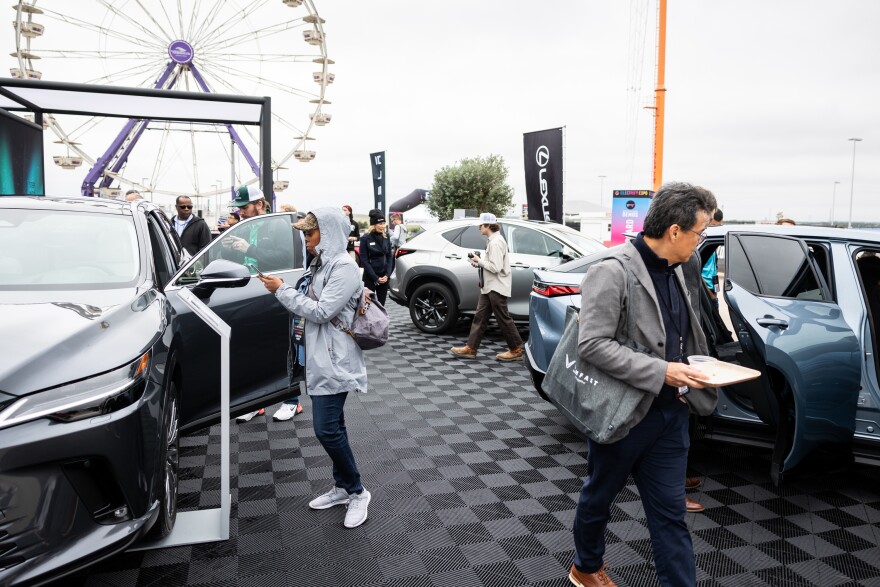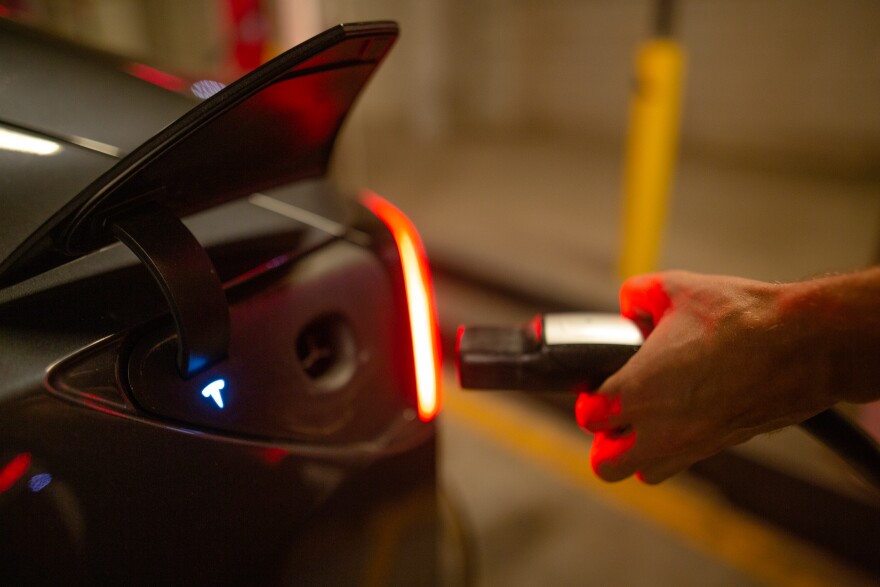Austin is leading the shift to electric vehicles in Texas.
More than 2.1% of registered vehicles in Travis County are now battery-powered cars and trucks, registration data obtained through the Texas Public Information Act shows. The number doesn't include hybrids. Travis County's EV adoption rate is the highest of the five biggest counties in the state.
More than half of the EVs on Austin's roads are Teslas, Austin Energy says. The electric vehicle giant is based in Travis County.
A 2% adoption rate might not sound like much, but it signals "a big change that happened recently," said Gil Tal, a leading expert on electric vehicles who runs a research center on EVs at the University of California, Davis.
For comparison, California — which leads the nation in electric vehicle adoption — is nearing a 3% EV ownership rate. The state has spent heavily to promote EVs and plans to ban the sale of new gasoline-only vehicles by 2035.

Williamson County is not far behind Travis. More than 1.5% of registered vehicles are electric in the county, and residents have been snapping up EVs at a faster clip. For example, more than 5% of Williamson County's new vehicle registrations in September were electric. In Travis County, it was 3%.
Hays County has been slower to shift to electric vehicles. Records show 0.8% of cars and trucks in Hays County are powered by batteries.
In the state's largest population centers — the counties where Houston, Dallas, Fort Worth and San Antonio are located — EVs account for less than 1% of vehicles on the road, Texas Department of Motor Vehicles data show.
By absolute numbers, Travis County was in a virtual dead heat with Harris County for the most electric vehicles in Texas. Each had around 20,000. But Harris County has 3.4 million registered cars and trucks, more than three times the number in Travis County.
Electric vehicles are popular in Austin in part because the city's large technology industry fosters early adopters with larger incomes to bear the heftier price tag. The region's deep-rooted environmentalist community has been trading gas pumps for charging ports, too.
"People have been interested in sustainable energy and making the world green for quite some time in Austin," said Aaron Choate, president of the nonprofit Electric Vehicle Association's Austin-chapter. "As soon as people were able to, they were starting to shift to electric vehicles, and I think they're just going to continue doing so."
Tesla's 2,500-acre manufacturing facility in Southeastern Travis County represents a powerful corporate presence promoting EVs. The factory now employs "well over" 15,000 workers and will spend $750,000 this year on EV education programs, Tesla officials told Travis County commissioners last month, far more than required under a deal with the county to save Tesla millions each year in property taxes.
Transportation remains the biggest source of Austin's air pollution and contributes significantly to climate-warming greenhouse gases. So the city has adopted policies to encourage EV ownership, for example, by subsidizing the installation of charging stations.
But Austin is still falling short of its own goals.
The city's climate plan, adopted just two years ago, calls for 3% of cars on the roads to be electric by 2023.
The road to electrification is paved with challenges. One of the biggest barriers is how much it costs to buy an EV.
EVs aren't as cheap as gas cars yet
In an unassuming strip mall on South Congress Avenue, Moment Motor Co. caters to the highest end of the EV market, converting collectible cars and trucks into electric classics.
The garage's mechanics rip out and replace the parts from premium vintage vehicles of yesteryear: a 1963 Corvette Stingray, a 1960 Ford F-250, a 1948 Chevrolet Stylemaster.

Parked just outside the garage, a red 1988 Porsche 911, once the epitome of gas-powered performance, had been refitted with an electric engine offering even faster acceleration.
"Oh yeah, way faster," explained company founder Marc Davis, a former tech recruiter who made his passion for cars a business in 2017. "Physics is on the side of electric motors."
Electric motors give instant torque, the immediate delivery of maximum twisting force on the wheels. That's why Ford's electric F-150 can go from zero to 60 mph in under four seconds, faster than some gas-powered Porsche 911s.
"There's an environmental reason for a lot of people [to buy EVs]. There's a uniqueness aspect for a lot of people," Davis said. "But ultimately there's a performance aspect to it. And I think that's the case with electric."
Moment Motors' prices are as extreme as the vehicles. The company charges anywhere from $50,000 to $150,000 to switch a car from gas to electric. That doesn't include the vehicle — and some are worth more than the cost of the conversion.

Back down at ground level, the average non-luxury new electric vehicle cost about 45% more than a comparable gas-fueled car last year, the U.S. Department of Transportation says. EVs can save money in the long run on fuel and maintenance costs, but still require a higher upfront investment.
“There still hasn’t been many [electric] cars announced that will be below, let’s say $38,000-$39,000," said Caleb Miller, an editor at Car and Driver magazine who closely tracks what's expected at dealerships in the years ahead.
For example, Toyota’s battery-powered compact crossover, the bZ4X, starts at $42,000 — almost twice as much as a new Corolla. The company had a catalog of electric cars on display this month at Electrify Expo, an electric car show that drew thousands of curious enthusiasts to Circuit of the Americas.

The federal government will soften the blow. Most new EV purchases qualify for a tax credit of up to $7,500. Starting this year, the IRS began offering a $4,000 credit for used electric vehicles. The tax credit can be claimed only once in a vehicle's lifetime. So you can't get the break if a previous owner of your used EV already has.
Soaring interest rates are chipping away at those federal incentives by punishing consumers with higher monthly payments. The average interest rate in Texas is now above 7% for new vehicles and higher than 12% for used, according to the automotive website Edmunds — some of the highest rates since 2015.
But Austin's climate policy calls for more than a third of the city's vehicles to be electric by the end of the decade. Council members have said they'll keep pushing.
"Absolutely, if we can make it easier for people to get recharged, as easy as it has been for them to fill up their gas tanks, then I think the reluctance for them to shift over to EVs will be reduced," said City Council Member Leslie Pool, who chairs a committee that oversees Austin Energy.
The city-owned utility has more than 1,600 ports in its charging network. But only 30 of those are DC-fast charging stations, which can refuel a car in minutes. The rest are so-called Level 2 chargers. Those take hours.
Austin Energy offers unlimited refueling on Level 2 chargers for a flat fee of $4.17 per month. The high-powered DC fast chargers cost 21 cents a minute. Those take from 20 minutes to an hour to get a battery 80% charged, at which point people are advised to unplug because charging slows dramatically.
Depending on the vehicle, a single charge could allow it to go anywhere from about 100 to 400 miles.

"I want to see more. I want to see fast ones," Pool said of the city's chargers. "There should be enough that you don't have to wait in a queue in order to get plugged in."
Austin Energy applied for a $15 million federal grant to install more electric vehicle chargers, including 80 DC-fast chargers. An announcement on the award is expected by the end of the year.
Most people charge their vehicles at home. Austin Energy will rebate up to half the cost of installing a charger.
But more than half of Austinites are renters, according to census data, so charging at home might not be an option.
Austin Energy is offering a limited time rebate of up to 80% for the cost of installing EV chargers at multifamily properties like apartment buildings. The program is in its infancy and exclusively targets electric vehicle carshare programs in partnership with affordable housing nonprofits.
The last time Austin Energy offered a rebate for installing chargers at multifamily properties in 2015, only 20 landlords participated.
The public utility says it wants charging stations in neighborhoods that have been historically neglected. But it won’t have a map showing the locations of ideal charging stations till the middle of next year at the earliest.
Federal cash pouring in

Inside the Texas Capitol, lawmakers voted this year to regulate EV charging stations much like gas pumps. The Texas Department of Licensing and Regulation will conduct inspections on chargers and set up a complaint process for consumers.
Lawmakers infuriated EV owners by imposing a new $200 annual registration fee in September. People buying new electric vehicles have to pay two years up front. The money is supposed to replace lost gasoline taxes that fund road construction and maintenance.
But the Texas Legislature also passed a bipartisan law that aims to ensure the state has enough chargers to allow someone to drive border-to-border in an electric car, even through rural or low-income areas.
"Republican leadership is taking a look at this issue and saying, 'We need to put foundation blocks in place.' They can see the change coming," said Tom "Smitty" Smith, the executive director of TxETRA, a nonprofit promoting policies to expand electric vehicle adoption.
The federal government is pouring $407 million into Texas over five years, more than any other state, to set up charging stations along major highways. The money is from the bipartisan infrastructure law passed in 2021.
"They're also looking at big business and big manufacturing plants," Smith said of the state's political leadership. "They're looking at this as the next big wave of industrial development and saying, 'We need to get ready and be able to get our share.'"











